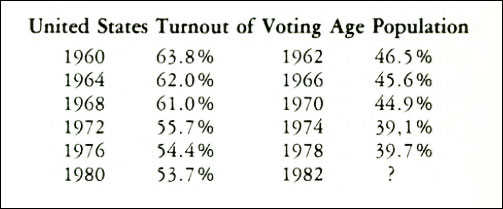Remember to Vote — It Does Matter
Posted on Oct. 26, 1982Does one vote really matter? Yes! A change of one vote per precinct in 1960 would have defeated John F. Kennedy in his campaign for president. Still, since 1960 there has been a steady decline in voter turnout. President Reagan in his landslide victory of 1980 actually received fewer votes than did Gerald Ford in 1976. In fact, only 27 percent of the U.S. voting age population actually cast their ballots for Ronald Reagan in November 1980.
In less than a month voters will go to the polls to cast their ballots for candidates and causes of their choice. There will be at least one party, candidate, or cause for everyone.
As an undergraduate here in the late ’60s, I was active in student government. In fact, I was campaign manager for what I believe was the last University of North Carolina Student Body President to be nominated by a student political party — Alan Albright nominated by the University Party (UP) served as Student Body President in 1969-70.
Since graduating from UNC, every even-numbered year I have been actively involved with one or more political campaigns — either in a staff capacity or as a consultant. This will be the first November election I will not be sharpening my pencil and posting voting returns or identifying election trends.
Among its many responsibilities, a public University is charged with developing good citizens as well as good students. Chapel Hill has a record of achievement in this respect. Thirty-two of the 64 governors of North Carolina have been alumni of the University at Chapel Hill. For years UNC alumni have served with distinction as city council members, county commissioners, mayors, state legislators, Congress persons, U.S. Senators, Governors and, as many of you know, we have even had a U.S. President who attended the University — James Knox Polk.
Yet, because we have provided leadership, more is expected of us. With 146,000 living alumni in all 50 states, we are positioned to have a significant impact on the vital issues facing our communities, our state, and the nation. Take, for example, some of the important issues now facing higher education: questions of adequate funding, the level of support for student financial aid, public support to private colleges and universities, and others. Whether you vote or not, politicians will be elected who will decide these questions. This great University and others like it could suffer at the hands of those elected, if they do not share your concerns about the vital issues facing higher education.
I do not mean to suggest that you should engage in single-issue politics or that the candidate’s position on key issues should be the sole guide to determining your support. Certainly questions regarding the President’s economic recovery program, the nuclear freeze movement , and world peace are of great concern to all voters this November .  Candidates can be ” right” on your key issues but lack some of the other basic attributes necessary for effective public service — honesty, hard work, good judgment, courage, vision, intellectual capacity, physical and emotional health and character — to name just a few.
Candidates can be ” right” on your key issues but lack some of the other basic attributes necessary for effective public service — honesty, hard work, good judgment, courage, vision, intellectual capacity, physical and emotional health and character — to name just a few.
It is not my purpose to support candidates or to suggest candidates or causes worthy of your support. My partisan political involvement is behind me. However, I am partisan about this University, and like you, I care about our country. And, I know if we are to protect and to preserve the quality of the University at Chapel Hill and fulfill the vision the founding fathers held for the republic, we have an obligation as citizens to at the very least — VOTE!
Yours at Carolina,

Douglas S. Dibbert ’70
